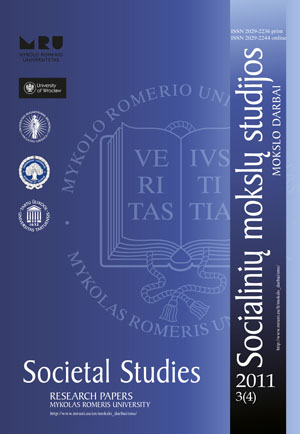JAV nepriklausomų institucijų konstitucingumas ir skiriamieji bruožai
The Constitutionality of U.S. Independent Agencies and Their Distinctive Features
Author(s): Ieva DeviatnikovaitėSubject(s): Social Sciences
Published by: Mykolas Romeris University
Keywords: the doctrine of separation of powers; administrative agency; independent regulatory agency; executive agency
Summary/Abstract: This article discusses how the position of independent regulatory agencies harmonizes with the doctrine of separation of powers, what the characteristic features of independent agencies are and how they can be distinguished from the executive agencies. There are several reasons why scholars who dedicate their interest to independent regulatory agencies usually start their research from the American experience. First, independent regulatory agencies are an American invention (the very first independent regulatory agency was created more than one hundred years ago). Second, the existence of U.S. independent agencies influences European countries’ public administration institutions system. Third, the knowledge of American independent agencies and of mechanisms of their functions can stimulate improvement of the pattern of independent agencies in a number of European countries. American scholars and practitioners argue that independent agencies do not harmonize with the tripartite structure of government and that they may be considered as a fourth branch. Two major conceptions have been developed — unitarism and functionalism. Unitarists assure that all agencies must be hierarchical, unified executive departments under the direct control of the president. Functionalists favor a more flexible position on the separation of powers, they claim that the concept of separation of powers only applies to the three branches and not to the parts of government below that level. However, it might be said that the U.S. Supreme Court acknowledges the existence of independent agencies and that their system does not contradict the U.S. Constitution which is based on the principle of separation of powers. There are a lot of ways to categorize administrative agencies in America. That is why it is complicated to define clear features of independent agencies. American scholars do agree that there are some characteristic elements typical of independent agencies. First, they are not subject to the Cabinet control. Second, the officers of these agencies are appointed by the president but they can be removed only “for cause.” They are appointed for fixed terms (five or seven years) and these agencies are collegial. Third, functions of the independent agencies reflect legislative, executive and judicial powers.
Journal: Socialinių mokslų studijos
- Issue Year: 3/2011
- Issue No: 4
- Page Range: 1497-1514
- Page Count: 18
- Language: Lithuanian

